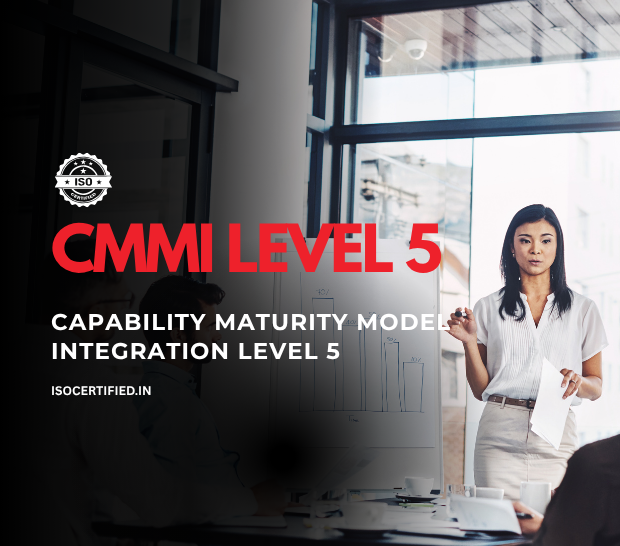- Globally Recognized Certification
CMMI Level 5 - Capability Maturity Model Integration Level 5
CMMI Level 5 Certification represents the highest maturity level in software and systems development, demonstrating optimized processes with continuous improvement driven by quantitative feedback and innovative technologies. This elite certification validates organizational excellence in predictable performance, defect prevention, and proactive process optimization.
Request A Free Quote
What is CMMI Level 5 – Capability Maturity Model Integration Level 5 Certification
CMMI Level 5 Certification is the pinnacle achievement in process maturity, indicating that organizations have achieved optimizing process capability with focus on continuous improvement through incremental and innovative technological changes. This certification requires quantitative understanding of process performance variation, identification of root causes for exceptional results, and systematic deployment of improvements across the organization. Level 5 organizations utilize statistical process control, defect prevention methodologies, technology change management, and innovation deployment to achieve sustained competitive advantage through superior quality and productivity.
The certification demands demonstrated implementation of advanced process areas including Organizational Performance Management (OPM) and Causal Analysis and Resolution (CAR) beyond lower maturity level requirements. Organizations must show evidence of proactive defect prevention, continuous process optimization based on quantitative data, rapid technology adoption, and measurable improvements in cost, schedule, quality, and customer satisfaction. CMMI Level 5 represents organizational transformation where improvement becomes embedded culture rather than reactive activity, enabling predictable delivery excellence and market leadership.

- Benifits
Key Benefits of CMMI Level 5 Certification
This certification establishes industry leadership positioning, delivers superior project predictability, enables premium pricing justification, and attracts high-value clients seeking proven delivery excellence and minimal project risk.
Competitive Market Differentiation
Achieve elite status shared by less than 5% of global organizations, commanding premium contracts and preferred vendor status with Fortune 500 clients.
Predictable Project Delivery
Achieve exceptional accuracy in cost and schedule estimation through quantitative process management, minimizing budget overruns and deadline slippages.
Superior Quality Outcomes
Deliver products with significantly lower defect rates through systematic root cause analysis and proactive prevention mechanisms embedded in development processes.
Continuous Performance Improvement
Establish self-optimizing organizational culture where innovation and improvement drive sustained competitive advantage and operational excellence.
- Standard Process
Your Path to ISO Certification
Four straightforward steps to achieve ISO certification: consultation, documentation, payment, and certificate delivery—all managed remotely for your convenience.
Free Consultation
Connect with our ISO experts to discuss your certification needs and requirements.
E-mail Documents
Submit your organization's documents and information securely via email.
Make Payment Online
Complete your payment conveniently through our secure online payment gateway.
Get ISO Certificate
Receive your internationally recognized ISO certification upon successful audit completion.
- Which Industries?
Who Needs This
ISO 9001:2015 is applicable to organizations of all sizes and sectors—from manufacturing and healthcare to services and technology—seeking to improve quality, efficiency, and customer satisfaction.
Manufacturing & Production
Information Technology Services
Healthcare & Pharmaceuticals
Construction & Engineering
- Ongoing Requirements
Compliance & Maintenance
Post-certification, organizations must fulfill ongoing requirements including annual surveillance audits, internal reviews, and recertification to maintain their ISO certificate validity.
Annual Surveillance Audits
Certification bodies conduct yearly audits to verify continuous compliance with ISO standards and ensure your management system remains effective and up-to-date.
Recertification Every 3 Years
Complete recertification audit required every three years to renew your ISO certificate and demonstrate sustained commitment to quality management excellence.
Internal Audits & Reviews
Regular internal audits and management reviews must be conducted to monitor performance, identify improvements, and prepare for external certification audits.
Documentation & Training Updates
Maintain current documentation, update procedures for process changes, and provide ongoing training to employees on ISO requirements and their responsibilities.
